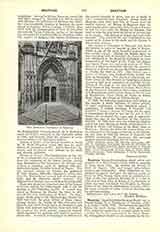

Beauvais, JEAN-BAPTISTE-CHARLES- MARIE DE, a French bishop, b. at Cherbourg, October 17, 1731; d. at Paris, April 4, 1790. The sermons he preached before the court during Advent, 1768, and Lent, 1773, raised his reputation as a pulpit orator to such a height that he was promoted to the See of Senez. He distinguished himself on all occasions by his devotion to the Church and is considered one of the best preachers of the eighteenth century. In 1783 he resigned his bishopric and settled at Paris. In 1789 he was made a member of the States-General. His sermons were printed at Paris in 1806, prefaced by an interesting account, written by the Abbe Boulogne, of the preacher and his discourses. The most celebrated of his funeral orations is the one on Louis XV; this discourse, however, failed to please the courtiers. The best of his panegyrics are one on St. Augustine, delivered before the Assembly of the Clergy of France, and one on St. Louis, before the Academie Franoaise.
Jos. N. GIGNAC.

